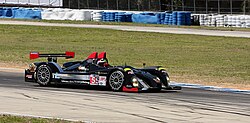Series
When the Formula Le Mans category was introduced in 2009, it was initially a support series for many races in the Le Mans Series in Europe as well as at the 24 Hours of Le Mans. The ten race Formula Le Mans Cup organized by the ACO and Oreca included over a dozen entries and was dominated by the DAMS driving pair of Gavin Cronje and Nico Verdonck, the latter of which won the inaugural Drivers Championship. Most races were one hour in length with a mandatory pit stop to allow teams to change drivers, while a season finale at Circuit de Nevers Magny-Cours was held for three hours.
Sportscars Winter Series
As a further development of the Formula Le Mans Cup, Oreca launched the Sportscars Winter Series in late 2009 in order to allow further amateur driver development during the Le Mans Series off-season. The series, which is held exclusively at the Circuit Paul Ricard, France, combines Formula Le Mans cars with competitors from the GT2 and GT3 grand tourer categories. The three race season includes two races of thirty minutes and one race of an hour in length. [6]
Le Mans Series
In the 2010 season the Formula Le Mans Cup was integrated into the Le Mans Series, becoming one of five categories within the series. The inaugural season, Formula Le Mans cars participated in four of the Le Mans Series' European races, while a fifth event held solely for Formula Le Mans cars. Teams will be required to have at least one amateur driver in order to further driver development. Championships will be awarded for professional drivers, amateur drivers, and teams, with the winning amateur driver earning a test in an Oreca Le Mans Prototype. [7] In 2012, the class adopted the Le Mans Prototype Challenge name and took part in the European Le Mans Series until 2014.
IMSA
On 16 August 2009, the International Motor Sports Association announced a reorganization of the class structure of the American Le Mans Series, creating a new category known as Le Mans Prototype Challenge. The class utilizes the Formula Le Mans ruleset similar to the Le Mans Series, and competes in all nine American Le Mans Series events. [2] American Le Mans Series regular Intersport Racing became the first North American team to purchase an FLM09, allowing the team to progress drivers from IMSA Lites, through LMP Challenge, and into their LMP1 category entry. After NASCAR Holdings purchased IMSA in late 2012 in preparation for the 2014 unification of sportscar racing in North America, tyres changed from Michelin to Continental, owing to the carryover Grand American Road Racing Association specification tyre contract with Continental. [1]
IMSA decided to drop the Prototype Challenge class from the championship at the end of 2017, thus retiring the class altogether. [8]
This page is based on this
Wikipedia article Text is available under the
CC BY-SA 4.0 license; additional terms may apply.
Images, videos and audio are available under their respective licenses.

